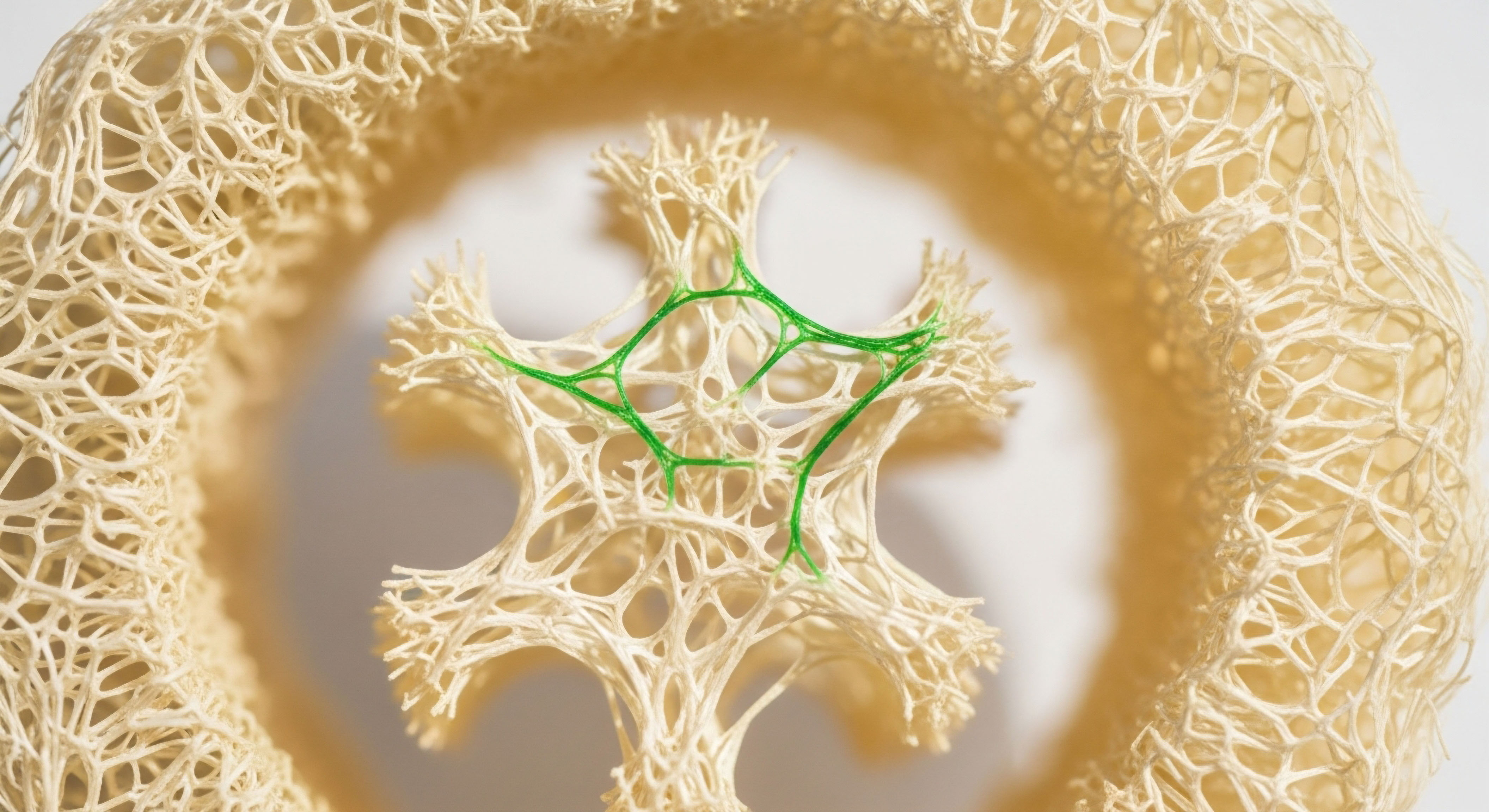

Fundamentals
That persistent feeling of being slightly off, the subtle fatigue that sleep does not seem to touch, or the frustrating sense that your body is not quite cooperating on the path to conception can be deeply unsettling. Your experience is valid. These feelings are often the first signals from a sophisticated internal system that is asking for attention.
We can begin to understand this by looking at the thyroid gland, a small, butterfly-shaped organ at the base of your neck. This gland functions as your body’s primary metabolic regulator, a sensitive instrument that dictates the pace of cellular activity throughout your entire system, including the intricate machinery of your reproductive health.
Supporting fertility through thyroid health begins with providing the precise raw materials your body needs to function optimally. The thyroid gland is a master of chemical conversion, and its performance is directly tied to the nutrients you provide. Think of it as a finely tuned engine that requires a specific type of fuel. Without the right components, its performance wanes, affecting everything from energy levels to the delicate hormonal choreography required for ovulation and conception.

The Essential Building Blocks for Thyroid Function
Your thyroid’s ability to produce its hormones, thyroxine (T4) and triiodothyronine (T3), is wholly dependent on a consistent supply of specific micronutrients. These are the foundational elements that enable the entire endocrine cascade to proceed smoothly. Understanding their roles is the first step in building a supportive nutritional framework for both thyroid wellness and fertility.
Two micronutrients are particularly central to this process:
- Iodine This is the primary, non-negotiable substrate for thyroid hormone production. The numbers in T4 and T3 refer to the number of iodine atoms attached to the hormone’s structure. The body cannot produce iodine, so it must be obtained through diet. Insufficient iodine intake directly limits the thyroid’s ability to synthesize hormones, a condition which can delay pregnancy. Sources include seaweed, cod, Greek yogurt, and iodized salt.
- Selenium This trace element acts as a critical cofactor for the enzymes that convert the storage thyroid hormone (T4) into the active thyroid hormone (T3) within your cells. Selenium also possesses powerful antioxidant properties, helping to protect the thyroid gland from the oxidative stress generated during hormone synthesis. Brazil nuts are an exceptionally rich source, with fish, turkey, and beef also providing significant amounts.
The thyroid gland’s production of essential hormones is directly dependent on the consistent availability of key micronutrients from your diet.

Beyond the Basics Other Key Nutritional Allies
While iodine and selenium are the headline acts, a supporting cast of other vitamins and minerals is just as important for maintaining the entire system’s equilibrium. Deficiencies in these areas can create bottlenecks in hormone production, conversion, or cellular uptake, subtly undermining your efforts.
Consider the roles of these nutrients:
- Zinc This mineral helps the hypothalamus, a region in your brain, to sense thyroid hormone levels and signal the pituitary gland to adjust thyroid-stimulating hormone (TSH) production accordingly. It is a key player in the hormonal feedback loop that keeps your system in balance.
- Iron Healthy iron levels are necessary for the proper functioning of thyroid peroxidase, the enzyme that attaches iodine to the hormone backbone. Iron deficiency can impair thyroid hormone production and is a common issue for women of reproductive age.
- Vitamin B12 This vitamin is essential for overall metabolic health and cellular energy. Low thyroid function can affect your body’s ability to absorb B12, and a deficiency can contribute to the fatigue often associated with thyroid conditions.
By viewing your diet through this lens, you begin to see food as functional information. Each meal becomes an opportunity to provide your body with the precise codes it needs to run its metabolic and reproductive systems with greater efficiency and resilience. This is the foundational step in your journey toward reclaiming vitality.


Intermediate
Moving beyond foundational nutrients, we arrive at a more dynamic understanding of thyroid health. It involves a complex communication network known as the Hypothalamic-Pituitary-Thyroid (HPT) axis. This elegant feedback loop is the central command system for your metabolism.
The hypothalamus in your brain releases Thyrotropin-Releasing Hormone (TRH), which signals the pituitary gland to release Thyroid-Stimulating Hormone (TSH). TSH then instructs the thyroid to produce T4 and a smaller amount of T3. When hormone levels in the blood are sufficient, they signal back to the hypothalamus and pituitary to slow down, maintaining a state of equilibrium.
Chronic stress, poor sleep, and dietary imbalances can disrupt these sensitive signals. The conversion of the relatively inactive storage hormone T4 into the potent, active hormone T3 is a particularly vulnerable process. This conversion happens primarily in the liver and other peripheral tissues, and it can be hindered by inflammation and nutrient deficiencies.
Inflammation, often driven by processed foods and high sugar intake, can slow this vital conversion, leaving you with symptoms of low thyroid function even when your TSH and T4 levels appear normal.

Dietary Strategies and the Gut-Thyroid Connection
The foods you consume have a profound impact on this system, extending far beyond simple nutrient provision. The concept of the diet ∞ gut ∞ thyroid axis reveals that the health of your digestive system is intrinsically linked to thyroid function. An imbalanced gut microbiome, or dysbiosis, can increase intestinal permeability, allowing undigested food particles and toxins to enter the bloodstream. This triggers a low-grade systemic inflammatory response that can directly impair thyroid hormone conversion and contribute to autoimmune processes.
The health of your gut microbiome directly influences thyroid function through mechanisms of nutrient absorption, immune regulation, and inflammation.
Different dietary frameworks can be utilized to support this axis, each with a unique focus. The goal is to reduce inflammation, stabilize blood sugar, and provide the necessary cofactors for hormone synthesis and conversion.
| Dietary Framework | Core Principle | Primary Focus for Thyroid Health | Key Foods |
|---|---|---|---|
| Mediterranean Diet | Whole foods, healthy fats, and low consumption of processed items. | Reduces systemic inflammation and provides a broad spectrum of vitamins and minerals. | Olive oil, fatty fish, leafy greens, legumes, nuts, seeds, whole grains. |
| Low Glycemic Load | Minimizes blood sugar and insulin spikes. | Helps to stabilize energy and reduce the inflammatory impact of high blood sugar. Some studies show it may decrease TSH and T3 levels. | Non-starchy vegetables, lean proteins, healthy fats, legumes, and certain fruits. |
| Autoimmune Protocol (AIP) | An elimination diet designed to identify and remove potential immune triggers. | Aims to reduce autoimmune activity (like in Hashimoto’s) by healing the gut lining and calming the immune system. | Nutrient-dense meats, fish, vegetables, and healthy fats, while eliminating grains, dairy, eggs, nuts, seeds, and nightshades temporarily. |

What Is the Impact of Protein Choices on Hormonal Balance?
The type of protein you choose can also influence hormonal pathways. Some research indicates that a higher intake of animal protein may be associated with a higher risk of anovulatory infertility, while plant-based protein sources may support fertility.
This could be related to the differential effects of animal versus plant proteins on insulin and Insulin-like Growth Factor 1 (IGF-1), hormones that are closely intertwined with reproductive function. Shifting a portion of your protein intake from animal to plant sources like lentils, beans, and quinoa could be a beneficial strategy for optimizing this delicate balance.


Academic
A sophisticated examination of thyroid health and fertility requires a deep exploration of autoimmunity, particularly Hashimoto’s thyroiditis, the most common cause of hypothyroidism in iodine-sufficient regions. At its core, Hashimoto’s is a condition of immune dysregulation where the body’s own defenses mistakenly target and attack thyroid tissue. This process is often underpinned by a complex interplay between genetic predisposition, environmental triggers, and increased intestinal permeability.
The scientific principle of molecular mimicry is central to this discussion. This phenomenon occurs when the protein structure of an external substance, such as a component of food like gluten (gliadin) or a pathogen, closely resembles the structure of a protein in the body’s own tissues, such as thyroid peroxidase (TPO).
In a genetically susceptible individual with a compromised gut barrier, the immune system mounts an attack against the foreign protein. Due to the structural similarity, this immune response can become misdirected, leading to a sustained attack on the thyroid gland itself. This autoimmune cascade can precede clinical hypothyroidism by years, often manifesting initially as fluctuating thyroid hormone levels and a general sense of malaise.

The Role of Intestinal Permeability and Immune Modulation
The integrity of the gut lining is a critical factor in preventing the initiation of such autoimmune processes. The tight junctions between intestinal epithelial cells are designed to allow nutrients to pass through while blocking larger molecules and pathogens.
When these junctions become compromised, a state often referred to as “leaky gut,” it allows antigens to cross into the bloodstream, activating the gut-associated lymphoid tissue (GALT), which comprises a significant portion of the body’s immune system. This activation can set the stage for systemic inflammation and autoimmunity.
Specific dietary interventions aim to restore the integrity of this barrier and modulate the immune response. A gluten-free diet is often recommended for individuals with Hashimoto’s, as a significant number of patients report symptomatic improvement. While large-scale clinical trials are still needed to form definitive guidelines, the rationale is grounded in removing a potential trigger for molecular mimicry and reducing intestinal inflammation. Other dietary components are also being investigated for their immunomodulatory effects.
Molecular mimicry provides a mechanistic explanation for how dietary proteins, in the context of increased intestinal permeability, can trigger an autoimmune attack on the thyroid gland.

Micronutrients as Immunomodulators in Autoimmune Thyroid Disease
Beyond their roles in hormone synthesis, certain micronutrients function as potent modulators of the immune system, capable of influencing the progression of autoimmune thyroid disease (AITD). Their strategic inclusion in a dietary protocol is a cornerstone of a functional approach to managing Hashimoto’s and supporting fertility.
| Micronutrient | Mechanism of Action | Impact on Thyroid Autoimmunity | Primary Dietary Sources |
|---|---|---|---|
| Selenium | Functions as a constituent of glutathione peroxidase, a key antioxidant enzyme. Reduces oxidative stress within the thyroid gland and has been shown to modulate T-cell populations. | Supplementation has been demonstrated in some studies to reduce levels of thyroid peroxidase antibodies (TPOAb). | Brazil nuts, tuna, sardines, beef, turkey, eggs. |
| Vitamin D | Acts as a hormone that regulates immune cell function, promoting a shift from a pro-inflammatory Th1-dominant state to a more balanced Th2 response. | Low Vitamin D levels are associated with a higher prevalence of AITD. Optimizing levels may help to temper the autoimmune response. | Fatty fish (salmon, mackerel), fortified milk, sun exposure. |
| Zinc | Essential for the normal development and function of immune cells, including T-lymphocytes and Natural Killer (NK) cells. It also plays a role in maintaining the integrity of skin and mucosal barriers. | Deficiency can lead to an imbalance in immune function. Adequate zinc is necessary for a properly regulated immune response. | Oysters, beef, pumpkin seeds, lentils, chickpeas. |
| Vitamin B12 | Plays a role in immune regulation. Deficiency is correlated with AITD, suggesting a relationship in immune function. | Correcting a deficiency may support overall immune health and address the profound fatigue associated with both B12 deficiency and hypothyroidism. | Clams, beef liver, trout, salmon, eggs, dairy products. |
By addressing the root drivers of autoimmunity through targeted dietary and lifestyle modifications, it is possible to quiet the immune attack on the thyroid. This approach supports the gland’s intrinsic function and fosters a more favorable internal environment for conception and a healthy pregnancy. It shifts the focus from merely replacing hormones to restoring the health of the entire system.

References
- Gare-Glin Fagbemi, et al. “The Role of Nutrition on Thyroid Function.” Nutrients, vol. 16, no. 15, 2024, p. 2496.
- Malinowska, A. M. et al. “Female Fertility and the Nutritional Approach ∞ The Most Essential Aspects.” Journal of Clinical Medicine, vol. 12, no. 13, 2023, p. 4347.
- Fagbemi, Gare-Glin, et al. “The Role of Nutrition on Thyroid Function.” ResearchGate, publication, 2024.
- Grygiel, B. et al. “Low-Glycemic Load Diets and Thyroid Function ∞ A Narrative Review and Future Perspectives.” Nutrients, vol. 16, no. 10, 2024, p. 1530.
- Marcin, A. “5 Natural Remedies for Hypothyroidism.” Healthline, 2023.

Reflection
You now possess a deeper map of the biological landscape connecting your daily choices to your hormonal and reproductive health. The information presented here is designed to be a starting point, a way to begin asking more precise questions about your own body. Your unique physiology, genetics, and life experiences shape how your systems respond.
The path forward involves listening to the signals your body is sending and understanding that this knowledge is the first, most powerful tool in your possession. True optimization is a personal dialogue between you and your biology, one that unfolds with curiosity and informed action.



